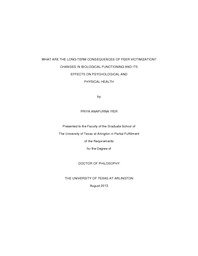
ATTENTION: The works hosted here are being migrated to a new repository that will consolidate resources, improve discoverability, and better show UTA's research impact on the global community. We will update authors as the migration progresses. Please see MavMatrix for more information.
Show simple item record
| dc.contributor.author | Iyer, Priya Anapurna | en_US |
| dc.date.accessioned | 2014-09-17T17:31:22Z | |
| dc.date.available | 2014-09-17T17:31:22Z | |
| dc.date.issued | 2014-09-17 | |
| dc.date.submitted | January 2013 | en_US |
| dc.identifier.other | DISS-12341 | en_US |
| dc.identifier.uri | http://hdl.handle.net/10106/24774 | |
| dc.description.abstract | Prior research has documented long-term psychological problems (e.g. emotional distress, anxiety, and depression; Kochenderfer-Ladd & Wardrop, 2001) experienced as a result of being bullied as an adolescent. Although being a recipient of peer victimization has been related to psychological health, limited research has looked at the association between peer victimization and physical health problems. Even fewer studies have investigated the relationship between being bullied and health outcomes over time. This dissertation examined whether peer victimization in early adolescence lead to changes in neuroendocrine functioning (as assessed by cortisol) and physical health outcomes several years later. Adolescents and their parents (N = 120) participated in this two phase study occurring over an approximate 2.5-year period. At the first assessment, adolescents and their parents answered questions about the child's social experiences, and psychological and physical health. In addition, the adolescent provided saliva samples (to assess cortisol levels). At the second assessment, adolescents and their parents completed identical surveys and adolescents provided an additional two days of cortisol samples. As expected, being peer victimized at the first assessment was related to poorer psychological and physical health problems at the second assessment as well as deteriorations in health. Moreover, this study found that peer victimization at time 1 (T1) was related to altered diurnal patterns of cortisol over time. Finally, this dissertation found that AUCg mediated the relationship of victimization at time 1 (T1) and psychological health problems for boys. This dissertation provided an important first step in beginning to understand the long-term consequences experienced by peer victims. | en_US |
| dc.description.sponsorship | Jensen-Campbell, Lauri A. | en_US |
| dc.language.iso | en | en_US |
| dc.publisher | Psychology | en_US |
| dc.title | What Are The Long-term Consequences Of Peer Victimization? Changes In Biological Functioning And Its Effects On Psychological And Physical Health | en_US |
| dc.type | Ph.D. | en_US |
| dc.contributor.committeeChair | Jensen-Campbell, Lauri A. | en_US |
| dc.degree.department | Psychology | en_US |
| dc.degree.discipline | Psychology | en_US |
| dc.degree.grantor | University of Texas at Arlington | en_US |
| dc.degree.level | doctoral | en_US |
| dc.degree.name | Ph.D. | en_US |
Files in this item
- Name:
- Iyer_uta_2502D_12341.pdf
- Size:
- 1.408Mb
- Format:
- PDF
This item appears in the following Collection(s)
Show simple item record


